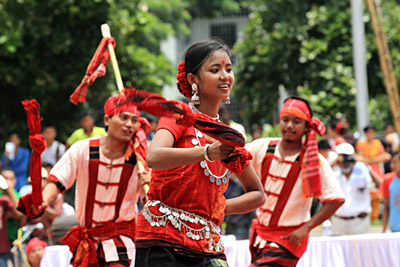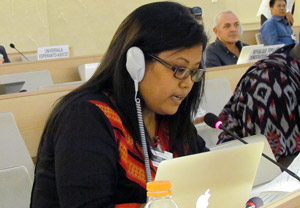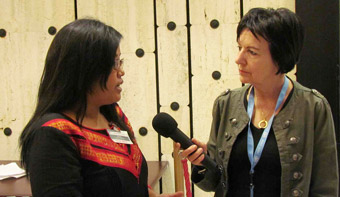| English Page |
Indigenous Peoples of Bangladesh at the United Nations |
 |
 |
| 20 July 2012 | ||||||
The protection of Indigenous Peoples’ land and their resources is fundamentally important for the realization of indigenous peoples’ right to culture
Indigenous peoples’ rights to language and culture are related to their self-determination and rights to their lands, territories and resources. The maintenance and development of indigenous peoples’ cultures requires the protection of their lands, territories and resources and their rights to self-determination. Indigenous peoples’ rights to culture may get violated in the case of denial of access to land, territories and natural resources. A keystone of poor conditions for indigenous peoples in Bangladesh is the continuing depletion of their natural resources, mainly through the expropriation of their lands. The protection of indigenous peoples’ land and their resources is fundamentally important for the realization of indigenous peoples’ right to culture. In Bangladesh, the customary land right of the indigenous people is frequently violated. In the name of conservation of forest, the right of the indigenous peoples to extract resources from forest, in accordance with customary law, is restricted and limited. Indigenous Jumma peoples in the Chittagong Hill Tracts (CHT) are being restricted to continue Jum cultivation. Both language and culture of indigenous peoples are interdependent pillars on which the identity of a people is maintained. In the Fifteenth Amendment to the Constitution of Bangladesh passed in the parliament on 30 June 2011, the government ignored the demand of indigenous peoples for recognition of their fundamental rights including recognition as indigenous peoples.
However, the government recognised the culture of indigenous peoples in the fifteenth amendment stating that “the State shall take steps to protect and develop the unique local culture and tradition of the tribes, minor races, ethnic sects and communities”. It is mentionable that the terminologies of “tribes, minor races, ethnic sects and communities” are not accepted by the indigenous peoples. Further, in the Fifteenth Amendment to the Constitution, the government of Bangladesh termed indigenous peoples as Bangalees stating that “the People of Bangladesh shall be known as Bangalees as a nation”. Indigenous peoples rejected this provision arguing that they are Bangladeshi as citizens, but they are not “Bangalee” as a nation. They all are a separate nation possessing separate identity, culture, customs and language. The Chittagong Hill Tracts Accord was signed in 1997 between Government of Bangladesh and PCJSS (Parbatya Chattagram Jana Samhati Samiti) to pave a way for the development and opportunities for indigenous peoples to meaningful engagement with special governance system in the Chittagong Hill Tracts. Due to the non implementation of that accord, dispute over land in the region is still unresolved and the Bengali settlements remain continued over the indigenous peoples land.
We firmly believe that human rights is interconnected with development, to be precise, sustainable development. While we believe we need to be part of progress, in the name of development our cultural, linguistic and political rights are being violated. We request EMRIP to provide us with specific guidelines that would allow us to resolve these tensions that exist between development processes and the cultural and linguistic rights of indigenous peoples. Statement by Lina Jesmin Lushai Kapaeeng Foundation, Bangladesh Indigenous Peoples Forum, and World Barua Organization presented at the Expert Mechanism on the Rights of Indigenous Peoples Fifth session, 9-13 July 2012 United Nations of Geneva |
 -->
-->















